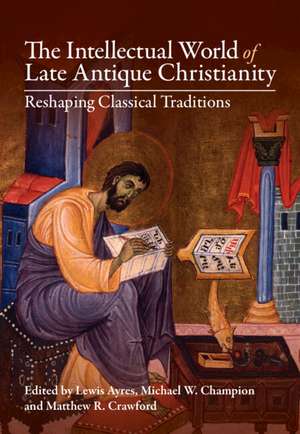The Intellectual World of Late Antique Christianity: Reshaping Classical Traditions
Editat de Lewis Ayres, Michael W. Champion, Matthew R. Crawforden Limba Engleză Hardback – 30 oct 2023
Preț: 875.91 lei
Preț vechi: 1137.55 lei
-23% Nou
Puncte Express: 1314
Preț estimativ în valută:
167.60€ • 174.65$ • 138.78£
167.60€ • 174.65$ • 138.78£
Carte disponibilă
Livrare economică 13-27 martie
Preluare comenzi: 021 569.72.76
Specificații
ISBN-13: 9781108835299
ISBN-10: 1108835295
Pagini: 734
Dimensiuni: 251 x 179 x 53 mm
Greutate: 1.91 kg
Editura: Cambridge University Press
Colecția Cambridge University Press
Locul publicării:New York, United States
ISBN-10: 1108835295
Pagini: 734
Dimensiuni: 251 x 179 x 53 mm
Greutate: 1.91 kg
Editura: Cambridge University Press
Colecția Cambridge University Press
Locul publicării:New York, United States
Cuprins
1. Modes of knowing and the ordering of knowledge in early Christianity Lewis Ayres, Michael Champion, Matthew R. Crawford; 2. The beginnings of a Christian doctrine of the spiritual senses before Origen Jane Heath; 3. Health, medicine, and philosophy in the school of Justin Martyr Jared Secord; 4. The structure of the ascetic self in Irenaeus of Lyons Paul Saieg; 5. The order of education and knowledge in clement of Alexandria Matyáš Havrda; 6. Origen's institutions and the shape of biblical scholarship Peter Martens; 7. Dialogue and catalogue: Fate, free-will, and epistemology in the Book of the Laws of the Countries Scott Johnson; 8. Iamblichus on divination and prophecy Peter Struck; 9. Cyprian, scripture and socialisation: forming faith in the catechumenate and beyond Edwina Murphy; 10. Sacrificial knowing: Cyprian and early Christian ritual knowledge Andrew McGowan; 11. Learning the language of God: tables in early Christian texts Andrew Riggsby; 12. The Aëtian Placita and the church fathers: creative use of a distinctive mode of ordering knowledge David Runia; 13. Nicaea's frame: the organisation of creedal knowledge in late antiquity and modernity Andrew Radde-Gallwitz; 14. The Arian controversy and the problem of image(s) Rebecca Lyman; 15. Imaging Ephrem the author Jeffrey Wickes; 16. Homilies as 'Modes of Knowing': an exploration on the basis of Greek patristic sermons (ca. 350-ca. 450 CE) Johan Leemans; 17. Dissemination of biblical narratives, motifs, and figures through early Christian inscriptions and homilies Cilliers Breytenbach; 18. How to make use of pagan knowledge without separating oneself from the church's milk: the function of otherness in Gregory of Nyssa's theory of self-perfection Jan Stenger; 19. Female characters as modes of knowing in late imperial dialogues: the body, desire, and the intellectual life Dawn LaValle Norman; 20. The Christianity of Latin Christian poetry Mark Edwards; 21. Ambrose's hymns as modes of knowing the 'Real' Brian Dunkle; 22. Confused voices: sound and sense in the later Augustine Carol Harrison; 23. Precision and the limits of human autopsy in Augustine's critique of pagan divination Michael Hanaghan; 24. Duplex via: authority and reason at Cassiciacum Gerald Boersma; 25. The object of our gaze: visual perception as a mode of knowing Robin Jensen; 26. Reconsidering the tholos image in the Eusebian canon tables: symbols, space, and books in the late antique Christian imagination Matthew Crawford; 27. Condemning the glutton of the monastery: rhetorical strategies and the epistemology of Philoxenus of Mabbug Jeanne-Nicole Mellon Saint-Laurent; 28. Evagrius of Ponticus on lupē: Distress and cognition between philosophy, medicine, and monasticism Jonathan Zecher; 29. Liturgical modes of knowing: coming to know God (and oneself) in sixth-century hymns and homilies Sarah Gador-Whyte; 30. Prolegomena to philosophy and the ascetic ordering of knowledge Michael Champion; 31. Bureaucratic modes of knowing in the late roman empire Sara Ahbel-Rappe; 32. The dissemination and appropriation of legal knowledge in the age of Justinian Peter Sarris; 33. The ordering of knowledge in four late patristic Christological handbooks Dirk Krausmüller; 34. World and empire: contrasting the cosmopolitan visions of Maximus the Confessor and George of Pisidia in seventh century Byzantium Paul Blowers; 35. Boethius on the ordering of knowledge John Magee; 36. Ordering emotional communities: modes of knowing in Gregory the Great Bronwen Neil; 37. Creating knowledge and knowing creation in late antique theological and scientific writing Helen Foxhall Forbes; 38. Hierarchies of knowledge in the works of Bede Zachary Guiliano; 39. Epilogue Teresa Morgan.
Descriere
Explores and contextualises ways of knowing and ordering knowledge in early Christianity in Greek, Latin, and Syriac-speaking milieus.
